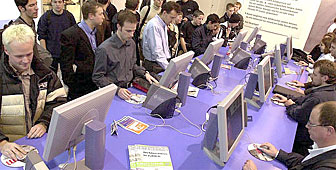Switzerland loses ground in world competitiveness league

Switzerland has slipped three places in the global competitiveness league, despite enjoying economic growth of 3.4 per cent in 2000, the best performance for a decade.
The World Competitiveness Yearbook, released on Wednesday by Lausanne’s Institute for Management Development (IMD), shows that Switzerland has fallen from seventh to 10th spot.
“The fact is that the rest of the world did just as well as we did and in a number of cases even better,” explains Professor Stephane Garelli, who is director of the competitiveness project.
The United States and Singapore remain first and second in the 2001 report, with Finland climbing from fourth place last year to take third place.
From a purely economic viewpoint, says Garelli, Switzerland continues to appear as a well-managed country.
“The cost of capital is low (2nd in the rankings), the confidentiality of financial transactions is guaranteed (3rd), labour legislation is flexible (4th), personal property and private property are protected (4th), government decisions are rapidly implemented (5th) and the education system is quite acceptable (5th),” says Garelli.
Switzerland leads the world as far as research spending per inhabitant is concerned, comes third in the health sector and fourth in infrastructure in general. It also does well in the finance sector, training for employees and respect for ethics at the workplace.
However, Garelli says the Swiss fall down in their attitudes to certain key issues. The report cites, in particular, Switzerland’s immigration laws, protectionism in certain industries, reticence about international economic agreements, reserve in the face of globalisation, little dynamism to start businesses and a lack of flexibility when it comes to change or opening up national culture to the rest of the world.
The IMD report shows Switzerland’s competitiveness is less “cyclical” than many other countries and its foundations rest on more solid structures.
“The very nature of our society – complex, diverse and prosperous – makes us also more passive about change,” says Garelli. “As a result, when the world grows, we grow at a slower pace and when it slows down, we slow less rapidly. That’s perhaps our opportunity for the year 2001.”
The report points out that economic slowdown in the United States and Japan, which represent 46 per cent of the world economy, will have global consequences.
“Their loss of momentum is likely to affect every nation around the world, but in particular Asia,” Garelli says.
As the report puts it, the year 2000 was a year of “economic exuberance”. It warns that the year 2001 may bring an “economic hangover”.
Some 3,623 executives filled out the IMD survey for this year’s report, rating countries on criteria ranging from labour costs and investment in research and development to education and society values.
The World Competitiveness Yearbook covers 49 economies using 286 criteria.
swissinfo with agencies

In compliance with the JTI standards
More: SWI swissinfo.ch certified by the Journalism Trust Initiative
You can find an overview of ongoing debates with our journalists here. Please join us!
If you want to start a conversation about a topic raised in this article or want to report factual errors, email us at english@swissinfo.ch.